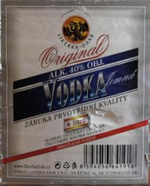
Last Friday, the Czech Republic's health ministry took the drastic step of banning sales of alcohol over 20% for the foreseeable future, after tests on the ground confirmed high methanol levels.
Health minister Leos Heger said the emergency measure banned the sale, serving and any offering of any 20%+ liquors, including domestic rum and food-grade spirit. It applies to all food businesses, including restaurants, a previous ban on September 12 covered kiosks.
The FSA said the poisonings were due to illegal spirits tainted with industrial methanol that were on sale in markets, restaurants and pubs in the Czech Republic; several of the brands potentially associated with the contamination are pictured in this article.
Aside from the 20+ deaths to date, a further 36 people have been admitted to hospital in the country after drinking the spirits, which include vodka and rum, marketed in the country as hard liquor with 20%+ ABV.
Colin Houston, FSA head of incidents, said his agency was advising people to be extra cautious when buying and drinking alcohol in the Czech Republic.
"In particular, we’re also warning people who may be bringing the locally produced alcohol back as souvenirs to be vigilant, as these so-called hard liquors can contain potentially lethal levels of methanol."
The FSA is warning the public not to purchase or consume the following products, since they may be affected by the contamination: Hanacka Vodka, Vodka Drak, Merunka, Borovicka, Svestkova vodka, Vodka Lunar and Tuzmak.
Gavin Partington, a spokesman for the UK Wine and Spirits trade association (which counts retailers and wholesalers among its ranks) told BeverageDaily.com: "We have notified our members [of the Czech situation]. But as you are aware this is an issue for government authorities - including the FSA - to issue a warning to consumers."
One of the brands mentioned by the FSA as a possible victim of bootleggers, Vodka Lunar, hit back in an online statement.
Likerka Pod Skalkou md, Jakub Nemec, complained that 12 years of hard work for his firm had been jeopardized by the work of criminals.
He said that some consumers had stopped buying the firm's rum and vodka, while other returned goods purchased long ago; the crisis had been an ordeal for his company, due to customs office and other inspections, journalists and television crews.
"I wonder how many media representatives will hear us now, and how much space they will give to the news that a manufacturer and distributor of counterfeits [carrying the Lunar name] was arrested by police in Zlin," Nemec said.
Speaking in Italy today, Czech president Vaclav Klaus described the deaths as a tragedy; his health ministry said yesterday that it was "out of the question" that the spirits ban would be lifted in the immediate future.
According to the Czech News Agency (CTK), the government set up an emergency committee last Wednesday to deal with the problem, which has seen 20m bottles of liquor stored in the country since the ban was declared.
Deputy interior minister Jaroslav Hruska told journalists yesterday that 23 people had been accused of illegal production and distribution of poisonous alcohol after more than 40 home searches.
The Czech customs authority has also seized 94,000 stamps for alcohol bottles, designated for an official liquor producer, but apparently destined for clandestine use.





